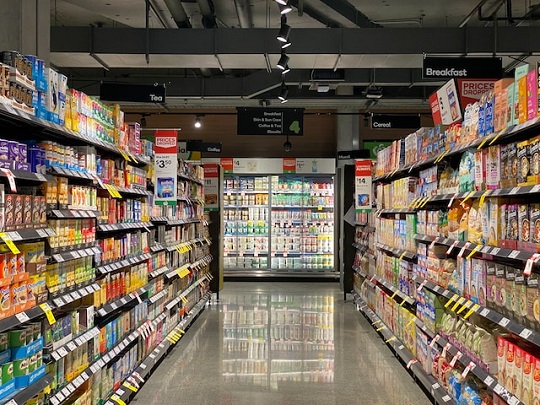In today’s busy business world, it’s super important for companies to manage their logistics (like shipping and storage) really well.
Some companies hire outside companies called third-party logistics providers (or 3PLs) to help with this.
It can make things easier and cheaper! But sometimes, doing it all in-house (by yourself) is actually cheaper.
Let’s look at 10 situations where using a 3PL ends up costing more than doing it yourself.
Before we go further into this topic, don’t forget to follow my LinkedIn account. You’ll get more helpful insights on supply chain management there.
Table of Contents
High Volume, Low Margin Products
For businesses that sell a lot of products with small profit margins, every penny counts to stay profitable.
Outsourcing logistics to a third-party provider can help with things like handling more orders and having experts on board. But the extra cost can be a big problem.
Since these businesses already make little profit per item sold, paying more for logistics could make things even harder financially.
This is especially true because some third-party providers charge more when businesses ship a lot of products.
It’s important for these businesses to carefully think about whether outsourcing is worth it.
While it can make things run smoother and save time and effort, they need to weigh the costs, like shipping and storage fees.
Finding the right balance between saving money and getting good service is key.
Making the wrong choice could make it even tougher for these businesses to stay profitable in a tough market.
So, they need to carefully think about the costs and benefits before deciding to outsource logistics.
Complex Supply Chain
In complicated supply chains with lots of suppliers, international shipping, and tricky distribution networks, it’s super important for companies to keep a close eye on their logistics (like getting things from suppliers to customers).
For businesses dealing with all this complexity, managing logistics themselves is often cheaper and smarter.

When they handle everything from buying to delivering stuff, they can avoid risks that come with relying on outside partners and make sure their logistics match up with their big business goals.
Doing it all in-house also lets them adapt quickly to changes in the market, laws, and what customers want, so they stay flexible and responsive.
Plus, managing logistics themselves means they can customize how they do things to fit their exact needs, using their own skills and tools to make everything run smoothly. This makes them more competitive and able to bounce back from challenges.
While hiring outside help for logistics might seem like a money-saver and bring in specialized knowledge, the complications of complex supply chains often mean it’s better to keep things close and hands-on.
For companies dealing with these tricky supply chains, managing logistics internally gives them the upper hand in staying in control, keeping track of everything, and being able to adjust to the ups and downs of global business.
Customized Services
In industries where companies need really specific logistics, having their own team to handle it all is usually better than saving money by hiring an outside logistics provider. These businesses have unique needs that can’t always be met by off-the-shelf solutions.
By keeping things in-house, they can be more flexible and quick to adapt to changes in the market.
This means they can customize their logistics to fit exactly what they need, making everything run smoother and better than if they used a standard outside provider.
Having their own logistics team also gives them more control and oversight over everything, which is super important in industries with lots of rules or complicated setups.
With their own experts and resources, they can solve problems before they even happen, come up with new ideas, and make sure everything meets their high standards.
While hiring an outside logistics provider might save money and bring in specialized knowledge in some cases, businesses with really unique logistics needs think having their own team is worth it. It helps them keep things running smoothly, meet customer needs, and stay ahead in their industries for the long run.
You might also like:
- 10 Strategies to Succeed in Supply Chain without Formal Education
- Top 10 Important Roles of Supervisors in Warehouse Operations
Sensitive or Perishable Goods
Industries that handle sensitive or perishable goods, like medicines or fresh food, need special logistics to keep their products safe.
When these industries manage their logistics in-house, they have more control over important things like temperature and handling.

This is super important for keeping their products in good condition and making sure they work the way they’re supposed to.
By setting up their own facilities and rules that fit their needs, companies can follow strict rules and avoid problems like temperature changes or delivery delays.
Even though it costs more at first to have their own logistics team and setup, the benefits in the long run, like having better products, following the rules, and keeping customers happy, make it worth it for industries that deal with sensitive or perishable goods.
Also, handling logistics in-house helps these industries keep a closer eye on everything that happens in their supply chain. By taking charge of storage, transportation, and delivery themselves, they can use strong systems to track and check on their products in real-time.
This not only keeps their products safe and high-quality but also lets them make quick decisions if anything goes wrong.
In the end, it’s smart for industries with sensitive or perishable goods to handle their logistics themselves because it gives them more control, lets them follow the rules, and helps them stay ready for anything that might happen.
Strategic Confidentiality
In industries where keeping secrets is super important, like tech or manufacturing, handling logistics internally is usually the way to go. This helps companies keep their important info safe from outsiders.
By doing logistics themselves, they can control who knows what, protecting their secrets from leaks or hacks that could hurt their competitive edge.
They can set up strict rules and only let authorized people handle the info.
Doing logistics in-house also lets companies customize their security to fit their needs. Whether they’re moving prototypes or secret materials, they can make sure everything stays safe from spies or unauthorized access.
Even though hiring outside help for logistics might save time and money, the risk of exposing secrets is too big a downside for companies that need to keep their info safe.
So, for industries where keeping secrets and staying ahead is crucial, doing logistics internally is a must to protect their important stuff and keep their edge.
Variable Demand
For businesses that deal with unpredictable demand for their products, working with a third-party logistics provider (3PL) can be really tough.
Changes in demand make it hard to agree on steady prices with 3PLs. Sometimes, when demand suddenly goes up, businesses have to pay more for shipping or storage during busy times.

This can end up costing them more money over time. Plus, 3PLs often charge more when demand is high, which makes managing costs even trickier for businesses with fluctuating demand.
Relying on a 3PL to handle logistics adds another layer of difficulty when it comes to dealing with changing demand.
While outsourcing logistics can help businesses adjust to ups and downs in demand, the contracts and agreements with 3PLs might make it hard for them to react quickly to market changes.
This lack of flexibility can lead to higher costs and less efficient operations for businesses that see big changes in demand for their products.
So, for businesses dealing with these challenges, managing logistics in-house might be a better option.
It gives them more control and flexibility to handle unpredictable demand, which can ultimately help them save money and stay resilient.
Regulatory Compliance
In industries like healthcare and aerospace, following strict rules is a big deal, even when it comes to handling logistics.
Doing logistics in-house gives these industries more control over following the rules. It means they can make sure that everything from transporting to storing stuff meets all the rules they need to follow.
By handling logistics themselves, companies can set up strong rules and checks that fit the specific rules they have to follow.
This helps them avoid penalties for not following the rules properly if they were to hire outside companies.
It also lets them keep detailed records, do regular checks, and fix any problems quickly to keep their reputation and stay in good standing with the rules in their industries.
Doing logistics in-house also means that these industries can train their staff really well on how to handle important stuff safely.
By giving their workers lots of training and making sure they have the right certifications, companies can make sure their staff knows exactly how to follow all the rules.
This not only helps them follow the rules better but also makes their operations run smoother and helps them manage risks better.
In the end, for industries where following rules is super important, doing logistics in-house is a must to avoid problems, keep people safe, and keep their industry reputation intact.
You might also like:
- Mastering Inventory Audits: A Comprehensive 10-Step Guide for Success
- Top 10 Key Considerations in Choosing Self-Managing Logistics or Using 3PL Services
Brand Reputation
In industries where having a good reputation and making customers happy is super important, keeping control over logistics is key.
When companies let someone else handle their logistics, like a third-party provider, they’re putting their reputation at risk. If the third-party messes up, it reflects badly on the company.

For businesses that really care about their brand and keeping customers loyal, even one mistake in shipping or delivering goods late can make customers lose trust.
But when companies manage logistics themselves, they can set high standards, make their own rules, and watch over every step of the delivery process.
This helps them avoid mistakes and keep their brand strong.
Taking charge of logistics also lets companies deal with problems quickly and keep customers happy.
When they handle logistics in-house, they can respond fast to what customers need, fix problems easily, and make things better based on feedback.
This not only makes their brand look reliable and great but also makes customers happy, which keeps them coming back for more and sticking with the brand for the long haul.
So, for companies that really care about their brand and keeping customers happy, handling logistics themselves is a smart move to protect their reputation and give top-notch service that matches what their brand promises.
Seasonal Fluctuations
For businesses that see big changes in demand throughout the year, it’s smarter to handle logistics themselves instead of hiring an outside company.
When demand goes up or down suddenly, companies need to be able to adjust their logistics fast to keep customers happy.
But if they’re locked into contracts or prices with an outside logistics provider, it can be really tough to change things quickly.
By doing logistics in-house, businesses can change how many resources they use based on demand, which helps them save money without being stuck following outside rules.
This flexibility means they can put more resources into making sure they can deliver on time when demand is high, and then scale back when things slow down to save money.
Handling logistics themselves also lets businesses use their own stuff more efficiently when demand goes up or down.
Instead of relying on outside partners who might not have enough resources when demand is high, companies can use their own resources better to meet the changes in demand.
This makes everything run smoother and gives them more control over their whole supply chain, which helps them make quick decisions and adjust to changes in the market.
In the end, for businesses that see big changes in demand, managing logistics themselves helps them save money and stay flexible to handle whatever comes their way.
Long-term Cost Considerations
At first, hiring an outside company to handle logistics might look like a good way for businesses to save money and work more efficiently.
But it’s really important for businesses to think about what that decision means in the long run.

Even though these outside companies might offer low prices at first, there could be extra costs hidden in the contracts or fees that pop up later.
Plus, businesses might lose control over things like extra fees for fuel or other charges that the outside company adds on.
These extra costs, along with the possibility of paying more when contracts are renewed, can cancel out the savings and end up costing businesses more in the long run.
Businesses also need to think about the trade-offs between saving money now and having more control over their logistics in the long term.
While hiring an outside company might seem easier and take some tasks off their plate, it means giving up control and being less able to see what’s happening in their supply chain.
When businesses handle logistics themselves, they can keep a close eye on everything and change things quickly when the market or customers change. This helps them save money by being smart about how they use their resources and find solutions that fit their needs exactly.
In the end, even though hiring an outside company might look like a good money saver for now, businesses need to think about the long-term effects and consider the benefits of managing logistics themselves.
Conclusion
So, to sum up, even though using third-party logistics providers can be really helpful with their expertise and ability to grow with a business, there are times when it’s smarter and cheaper to handle logistics yourself.
Businesses need to think hard about what they need, how their industry works, and what they want to achieve in the long run to decide the best way to manage their logistics.
I hope you find it helpful!
Please share this article with your colleagues so they can also benefit. For more insights on supply chain management, follow my LinkedIn account. You’re free to use all articles on this blog for any purpose, even for commercial use, without needing to give credit.

 by
by 

